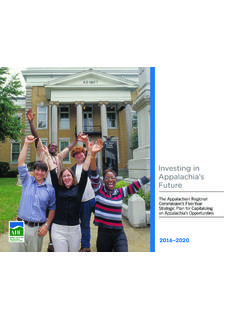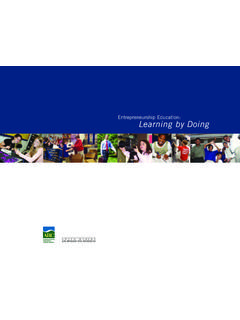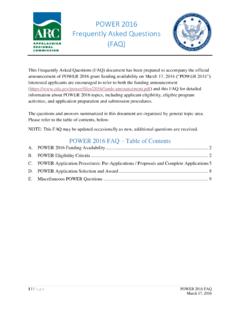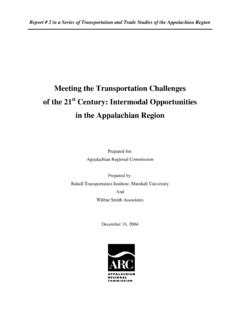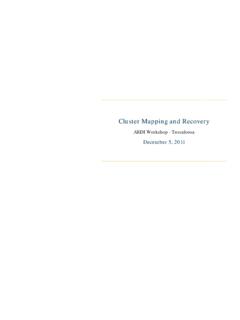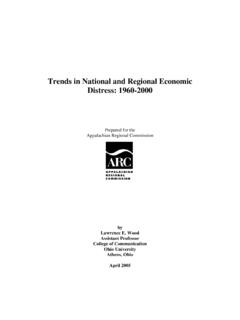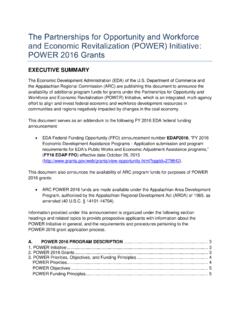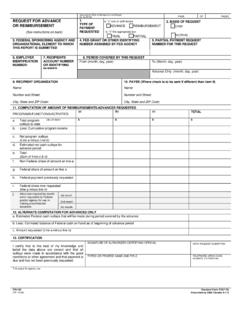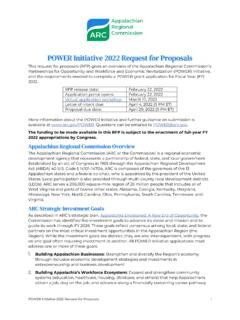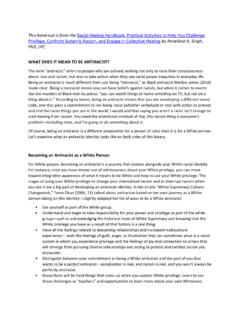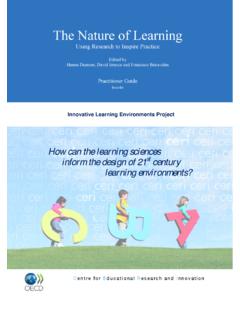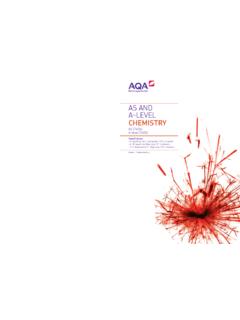Transcription of Investments Supporting Partnerships In Recovery Ecosystems ...
1 Investments Supporting Partnerships in Recovery Ecosystems ( inspire ) Initiative Federal Fiscal Year 2022 Request for Proposals for Project Grants This request for proposals (RFP) for project grants provides a general overview of the inspire Initiative, as well as the specific requirements needed to complete a grant application. RFP release date January 24, 2022 Application portal opens February 7, 2022 Portal link located here Pre-application workshop February 24, 2022 Register here Letter of intent due March 3, 2022 Grant proposal due March 24, 2022 Awards announced August 1, 2022 The closing date for receipt of applications under this announcement is March 24, 2022.
2 ARC must receive applications no later than 5 PM Eastern Time (ET). Further guidance on submission can be found at Questions can be emailed to Appalachian Regional Commission Overview The Appalachian Regional Commission (ARC) is a regional economic development agency that represents a partnership of federal, state, and local government. Established by an act of Congress in 1965 through the Appalachian Regional Development Act (ARDA) 40 Code 14101 14704, ARC is composed of the governors of the 13 Appalachian states and a federal co-chairperson, who is appointed by the president of the United States.
3 Local participation is also provided through multi-county local development districts (LDDs). ARC serves a 205,000-square-mile region of 25 million people that includes all of West Virginia and parts of twelve other states: Alabama, Georgia, Kentucky, Maryland, Mississippi, New York, North Carolina, Ohio, Pennsylvania, South Carolina, Tennessee, and Virginia. inspire Initiative Fiscal Year 2022 Request for Proposals Page 2 of 3 Contents Background ..4 Executive Summary ..4 Program Description .. 5 Grant Types and Amounts .. 6 Implementation Grants.
4 6 Implementation Grants: Eligible Activities .. 7 Planning Grants .. 8 Planning Grants: Eligible Activities .. 8 Eligibility Information .. 8 Ineligibility .. 9 Criteria for Implementation Grants .. 9 Executive Summary (required form) .. 9 Statement of Need (up to 27 points) .. 9 Project Description (up to 36 points) .. 10 Projected Outputs and Outcomes (up to 16 points) .. 11 Strategic Alignment (up to 6 points) .. 12 Budget and Budget Narrative (up to 5 points) .. 12 Feasibility (up to 5 points) .. 13 Organizational Capacity (up to 5 points) .. 13 Additional Required Forms.
5 13 Scoring Matrix for Implementation Projects .. 13 Criteria for Planning Grants .. 15 Executive Summary (required form) .. 15 Project Description (up to 25 points) .. 15 Strategic Alignment (up to 6 points) .. 16 Projected Output (up to 2 points) .. 16 Work Plan and Timeline (up to 3 points) .. 16 Budget and Budget Narrative (up to 4 points) .. 16 Organizational Capacity (up to 5 points) .. 17 Feasibility (up to 5 points) .. 17 Additional Required Forms .. 17 Scoring Matrix for Planning Projects .. 17 Cost Sharing or Matching .. 18 Application and Submission Information.
6 19 Letter of Intent .. 19 Applications .. 19 Unique Entity Identifier and System for Award Management (SAM) .. 20 inspire Initiative Fiscal Year 2022 Request for Proposals Page 3 of 4 Submission Dates, Times, and Instructions .. 21 Funding Restrictions .. 21 Indirect Costs .. 21 Application Review Information .. 21 Award Administration .. 21 ARC Agency Contact Information .. 22 General Disclosures .. 22 Appendices .. 22 Appendix 1: Sample Budget Narrative Template .. 22 Appendix 2: Indirect Cost Rates .. 23 Modified Total Direct Cost Rate Definition.
7 23 Appendix 3: Subcontractor vs. Contractor Determinations .. 23 inspire Initiative Fiscal Year 2022 Request for Proposals Page 4 of 5 Background The Appalachian Region (the Region) has been disproportionately impacted by the issue of substance use. Across decades, substance names have changed, but the individual and cumulative community-level impacts have compounded and continue presenting an impediment to socioeconomic and personal growth. Substance use disorder (SUD) prevention and treatment in the region have been extensively explored and described through research studies, funded community-based intervention programs, sponsored conferences, and publications.
8 One underlying theme that consistently emerges is that individuals with SUD encounter numerous barriers to entering the region s workforce, which can have a negative impact on workforce participation rates and economic development, with consequences that span generations. While new funding streams are important to effectively address the substance use crisis, the Appalachian Regional Commission (ARC, the Commission) has heard from Appalachian leaders regarding the need to better coordinate funds and to focus on an important goal: to assist individuals in Recovery to access an organized set of SUD Recovery services while pursuing training and education necessary to obtain, or maintain, employment (particularly regional demand-driven jobs and high-demand occupations that offer family-sustaining wages).
9 The Commission s work in this area is guided by several experts at the local, state, and federal level. On May 13, 2019, ARC announced the formation of the Substance Abuse Advisory Council (SAAC), a 24-member volunteer advisory group of leaders from Recovery services, healthcare, law enforcement, economic development, private industry, education, state government, and other sectors. By drawing on their own experiences as well as community insights gathered during ARC s six recent regional Recovery -to-Work Listening Sessions, the SAAC developed recommendations for ARC to consider as part of a strategic plan to build and strengthen Recovery Ecosystems in Appalachian communities.
10 For more information on the SAAC, visit the ARC website. Experts and community leaders consistently state that for persons in Recovery from SUD, having a job is an important component of successfully maintaining Recovery . The Commission carefully considered what role it could most effectively play to address the challenge of helping individuals in Recovery obtain and maintain employment. Building on decades of successful experience in engaging the empathy, energy, and expertise within communities, ARC pursued a process to define the elements needed to create community Recovery Ecosystems that could achieve the stated goal.
